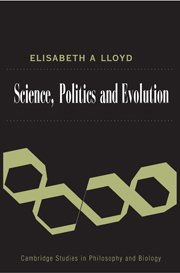Book contents
- Frontmatter
- Contents
- 1 The Nature of Darwin's Support for the Theory of Natural Selection
- 2 A Semantic Approach to the Structure of Population Genetics
- 3 Confirmation of Ecological and Evolutionary Models
- 4 Units and Levels of Selection
- 5 Species Selections on Variability
- 6 An Open Letter to Elliott Sober and David Sloan Wilson, Regarding Their Book, Unto Others: The Evolution and Psychology of Unselfish Behavior
- 7 Problems with Pluralism
- 8 Normality and Variation: The Human Genome Project and the Ideal Human Type
- 9 Evolutionary Psychology: The Burdens of Proof
- 10 Objectivity and the Double Standard for Feminist Epistemologies
- 11 Science and Anti-Science: Objectivity and Its Real Enemies
- 12 Pre-Theoretical Assumptions in Evolutionary Explanations of Female Sexuality
- References
- Index
11 - Science and Anti-Science: Objectivity and Its Real Enemies
Published online by Cambridge University Press: 27 February 2010
- Frontmatter
- Contents
- 1 The Nature of Darwin's Support for the Theory of Natural Selection
- 2 A Semantic Approach to the Structure of Population Genetics
- 3 Confirmation of Ecological and Evolutionary Models
- 4 Units and Levels of Selection
- 5 Species Selections on Variability
- 6 An Open Letter to Elliott Sober and David Sloan Wilson, Regarding Their Book, Unto Others: The Evolution and Psychology of Unselfish Behavior
- 7 Problems with Pluralism
- 8 Normality and Variation: The Human Genome Project and the Ideal Human Type
- 9 Evolutionary Psychology: The Burdens of Proof
- 10 Objectivity and the Double Standard for Feminist Epistemologies
- 11 Science and Anti-Science: Objectivity and Its Real Enemies
- 12 Pre-Theoretical Assumptions in Evolutionary Explanations of Female Sexuality
- References
- Index
Summary
INTRODUCTION
As the political activist Ti-Grace Atkinson wrote in 1970: “whenever the enemy keeps lobbing bombs into some area you consider unrelated to your defense, it's always worth investigating” (1974, p. 131).
Such an investigation is the primary aim of this essay. There are several interrelated pronouncements that materialize with mystifying but strict regularity whenever “feminism” and “science” are used in the same breath. These include: feminists judge scientific results according to ideological standards instead of truth and evidence, and are recommending that others do the same; feminists are all “relativists” about knowledge, hence they don't understand or don't accept the basic presuppositions of scientific inquiry; feminists – like many historians, sociologists, and anthropologists of science – wish to replace explanations of scientific success that are based on following the methods of science, with explanations purely in terms of power struggles, dominance, and oppression, and to ignore the role of evidence about the real world; in sum, feminists don't believe in truth, they reject “objectivity” as being oppressive, they are hostile to the goals and ideals of scientific inquiry, and they renounce the very idea of rationality itself.
Given that there is a well-known body of feminist work which has systematically articulated the negation of each of the above beliefs in black and white, there is certainly a mystery here.
- Type
- Chapter
- Information
- Science, Politics, and Evolution , pp. 202 - 254Publisher: Cambridge University PressPrint publication year: 2008



